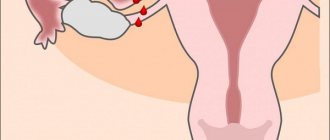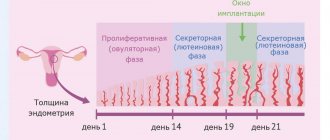Pregnancy is a special time when the expectant mother, expecting her baby, carefully monitors her feelings. Closer to the 30th week, many pregnant women notice the appearance of clicks inside the abdomen, which makes them worry. Basically, the phenomenon is not dangerous, since it is caused by physiological processes. However, similar sounds may indicate pathology, which is especially likely when additional symptoms are added.
Expert opinion
Almost all doctors consider the presence of clicks in the abdomen during pregnancy to be absolutely normal. Pregnant women themselves say that in this way the baby supposedly communicates with them. In fact, “stomach sounds” are provoked by the sounds produced by the ligaments, joints of the pelvic bones and muscles. This happens because the growing uterus constantly puts pressure on the bones and ligaments, which leads to their stretching. It is precisely the process of spraining the ligaments that is accompanied by characteristic clicks.
In addition, such sounds can cause movement of amniotic fluid when the baby is active. As a rule, “pregnancy sounds” appear in the third trimester, closer to childbirth. In the absence of accompanying symptoms, there is no cause for concern. Therefore, clicks that appear in the abdomen at the 37th week of pregnancy can be considered normal. In this way, your body prepares for the upcoming birth. This is inherent in nature, and there is no need to panic. On the contrary, it is recommended to communicate more with your baby, to prepare him for the moment of meeting you. Tactile contact is also important. If you hear that the clicks have become frequent and are accompanied by movements on the part of the child, then stroke the belly, thereby calming your Nutcracker.
A pregnant woman carries a real small world within herself, with its tasks, needs and structure. And you don’t know exactly what and how is happening there in this world, even though with the help of modern technologies you can count the number of heartbeats of a baby, and see his “father’s” or “mother’s” nose. But there are countless mysteries. For example,….clicks.
I was walking when I woke up at night from a strange sound like a click. It was as if someone snapped their fingers, “Hey, sex worker!” But this clear sound definitely came from the depths of my voluminous belly. It could have been attributed to nocturnal auditory hallucinations, if the next time my stomach didn’t click in the presence of my husband, he heard it too.
The baby and I had already gotten used to each other, I clearly identified his movements, rustling and other somersaults, I understood when he suddenly... And then it clicks on you. In a panic (don’t feed us pregnant women bread, let us find a reason to worry) I called my friend: “Katya, did you happen to have anything clicking inside during your pregnancy, somewhere above your navel?” The friend laughed: “I didn’t tell anyone except my husband, but there was a case, except for the options that the baby somehow snuck in a piece of bubble wrap and was sitting there having fun, popping the bubbles, we didn’t have any.”
Hurray, I’m not alone, besides, Katya’s baby has grown into a completely healthy three-year-old boy, so the degree of excitement has decreased. But still, at the next meeting with my gynecologist, I couldn’t resist asking a question. In addition, the belly continued to click from time to time
The doctor was terribly surprised, suggested that it was the intestines and suggested that we stop paying attention: “All the tests are normal, don’t look for difficulties for yourself.”
However, I did not calm down and went looking for a solution on the Internet. Everyone there already knows. They really did, but not for sure. But I received plenty of guesses about the source of my strange sounds. For example, they wrote that this is a child smacking his lips, sucking his fist, or clicking his tongue. Mothers said that when the baby was born, he made exactly these sounds. Others argued that these sounds are nothing more than the crunching of a child’s joints (in newborns, the joints actually crackle, this is due to the weakness of the ligamentous apparatus, and usually goes away on its own by the age of one year of the child’s life). The third is that they click your symphysis pubis when the baby is overly active. And there were also options that the sounds are made by the amniotic fluid, that the bubble “pecks” there when the child presses against it and then pushes away from it, and even that with such a sound the baby “releases gases.”
The main thing I realized is that if my strange clicks are not accompanied by pain or unpleasant sensations, there is no need to worry. And even more so, you shouldn’t worry about good CTG and ultrasound readings. True, for some, a ringing pop is accompanied by rupture of the amniotic membranes and the breaking of water
It is extremely important not to miss this moment. As for the rest - why worry? Maybe there is a little musician growing inside you who has begun his first rehearsals
However, I hope that one day doctors will reveal the secret of what is really clicking there?
Possible causes of clicking
There is still no consensus on the causes of clicking in the abdomen during pregnancy. Experts agree on only one thing: it is not dangerous.
It is likely that these sounds occur due to the fact that the baby is simply releasing gas, burping or hiccupping. If you observe such sounds quite rarely, this may mean that your child, for example, is biting his fist or sucking his finger.
Fetal movement may cause gurgling in the abdomen. When the baby is active, the amniotic fluid bubbles burst. This is what causes these sound effects.
Some pregnant women experience a kind of cracking sound in their stomach. These could be the child's joints. But don’t panic, this is also a normal process. After all, the baby’s skeletal system has not yet strengthened. By the way, you can hear such a crash until the child is one year old.
It also happens that all these sounds have nothing to do with the child. They are produced by the mother's body, for example, accompanying the digestion process. This may also be due to divergence of the pelvic bones. In this case, clicks in the abdomen at the 39th week of pregnancy may already indicate an approaching birth. And if they are accompanied by leakage of water or the release of a mucus plug, then you need to urgently go to the maternity hospital.
Clicking in the stomach during pregnancy - what to do
First of all, do not panic and contact your obstetrician-gynecologist with any concerns. Next, the woman needs to describe:
- The frequency of the appearance of clicks is a one-time occurrence, rare or often repeated.
- The intensity of the clicks is a barely audible or clearly audible sound.
- Is the appearance of clicking related to other factors (motor activity or body position of the pregnant woman, movements and activity of the child).
The doctor also evaluates the expectant mother’s medical history and the characteristics of the gestational period for a combination of the appearing clicks with other processes and symptoms. The decision regarding further examinations is made based on the information collected. Additional diagnostic procedures for a pregnant woman may include:
- Traditional abdominal ultrasound examination of pregnant women to check the condition of the baby, assess the condition of the baby's place, the umbilical cord and the amount of amniotic fluid.
- Ultrasound of the symphysis pubis (to exclude or confirm symphysitis).
- Dopplerography (or Doppler) - to assess the quality of blood circulation in the vessels of the uterus, placenta and umbilical cord, as well as determine the functionality of the “baby place”.
- CTG (cardiotocography) of the baby to assess the correct functioning of his heart.
The survey data is basic. In each specific case, the list of diagnostic procedures can be either shortened or expanded. The decision regarding further tactics is made based on the data obtained. If no deviations are detected, and the clicks do not cause pain or discomfort to the pregnant woman, there is no need to worry or take any measures. If deviations are detected, appropriate decisions are made.
Movement table
In gynecological practice, a table of movements is used, in which the pregnant woman enters her observations of the motor activity of the fetus. There are several varieties of it:
- The Pearson table (Count to Ten) is the most commonly used. Observation is carried out from 9 a.m. to 9 p.m. In this case, it is necessary to record the time of the 10th movement in a special table (for example, 12:30).
- Cardiff method. The woman independently chooses the time for observation (but also 12 hours) and records when the 10th movement occurred, the time of which is recorded on a special form.
- Sadowski's technique. After dinner, a pregnant woman lies down on her left side (these factors contribute to increased motor activity). Over the course of four hours, she should feel more than 10 separate tremors.
When using the Pearson or Cardiff methods, a pregnant woman can engage in daily activities, but without excessive physical exertion.
Why may a child move little or stop doing so?
If a pregnant woman feels less than 10 kicks per day, or the baby does not move for about 3-4 hours, you should consult a doctor. In most cases, a sharp decrease in activity indicates the development of fetal hypoxia, in which embryonic movements may be absent for 12 hours. If the pathology is not detected in time, the fetus freezes.
Physiological reasons
A child may reduce activity for the following reasons:
- the woman is in a noisy room, loud sounds can frighten the embryo;
- the fetus is in a state of sleep;
- a pregnant woman goes in for sports - with active movements, vibrations of the amniotic fluid are created, and the child may fall asleep;
- childbirth is approaching.
Starting from week 28, the fetus increases in size, occupying free space inside the placenta. It becomes difficult for him to move and roll over. The cramped space limits his activity.
Symptoms
The alarming clinical picture begins with the appearance of sharp and severe pain in the lower abdomen after 12-24 hours from the moment the fetus freezes. The pain syndrome is caused by increased peristalsis of the uterus, which seeks to get rid of the dead embryo. Other symptoms include:
- increased body temperature above +39°C;
- weakness;
- pale skin;
- increased sweating;
- uterine bleeding;
- thready pulse and drop in blood pressure;
- at a later stage, the breasts return to their natural size.
If your general health worsens, you should consult your doctor for a diagnosis.
Diagnostics
Cardiotocography and ultrasound with Doppler measurements allow hypoxia to be diagnosed in a timely manner. CTG helps to count the number of heartbeats of the embryo and record them in the form of a graph. Cardiotocography additionally determines the tone of the uterus. The procedure lasts about 20-40 minutes, during which the woman presses a button when she feels the embryo kicking.
To clarify the diagnosis, the doctor performs Doppler sonography, with which he establishes the speed of blood flow in the arterial vessels of the uterus and umbilical cord. Ultrasound allows you to evaluate the movements of the embryo, the volume of amniotic fluid, and the muscle tone of the uterus. If the data obtained indicates a serious condition of the child, the doctor decides to initiate premature labor or hospitalize the woman.
Causes for concern
The first cause for alarm is the absence of tremors for 2-3 hours. If movement does not resume after 6 hours, you must call an ambulance. The baby should move at least 10 times in 3 hours before the 26th week of pregnancy. At later stages, up to 12 shocks per day can be considered normal activity. If the movements do not correspond to the norm, it is necessary to undergo an instrumental examination.
What to do if there is no movement
It is not recommended to stay home if your health worsens. If the expectant mother becomes ill or does not feel fetal kicks for more than 6 hours, urgent hospitalization and examination using ultrasound and CTG are required.
Gurgling or clicking sounds
If there is a gurgling sound when clicking, then we can say that such features are associated with the child’s life activity. He cannot harm himself or his mother, but the clicking and gurgling sound can most often be associated with the peculiarity of the baby’s body turns and his excessive activity. Often pregnant women noted that such manifestations are observed during the process of turning the baby over to a permanent position - on its head.
Since the baby is completely immersed in water, such gurgling sounds are natural. It cannot be said that there is air in the uterus in the abdomen that rolls from place to place, but with active movements this is possible.
How to determine dangerous pulsation?
However, you should not completely ignore the signals that the body gives.
It is advisable to avoid squeezing the inferior vena cava, as the pregnant woman’s condition may worsen, headaches and nausea may occur. Also, when this vein is compressed, less oxygen will flow to the child.
And if the child’s hiccups recur quite often and do not stop for a long time, as well as in cases where the frequency or duration increases, it is necessary to consult a doctor for consultation in order to exclude the possible development of intrauterine fetal hypoxia.
In cases where the pulsation in the stomach of the expectant mother is accompanied by pain or physical discomfort is felt, you should immediately consult a doctor.
Heavy burden
In the eighth month, shortness of breath and frequent urination often appear. This is due to the fact that the fetus grows, the uterus enlarges and puts pressure on the diaphragm and the bladder. If you feel that it is very difficult for you, that you are short of breath, you can do the following exercise: get on all fours and inhale and exhale deeply several times. When you stand in this position, your stomach drops and there is room for air.
If you experience not the usual shortness of breath, but something more, if you turn pale, your lips turn blue, your limbs become cold and your fingertips tingle, urgently call your loved ones and call an ambulance. Such symptoms may indicate serious problems that require medical attention.
At the end of the seventh month, false, training contractions (Brexto-on-Hicks contractions) may appear. They look like real ones - squeezing pain, tension, pain in the lower abdomen. It lets go and grows again. The body trains before childbirth. Women are often scared - it’s already a long time. What if it started? One young dad complained to me: “I’m already tired of standing at attention. We have trips to the maternity hospital every week!” Well, at least I trained, so I won’t be confused when the real contractions begin.
False contractions last from thirty seconds to two minutes and usually stop when changing position or walking. We got up and walked around - it stopped. So, you can relax. Real contractions are much more painful and noticeable. They are repeated periodically and increase in intensity. However, if contractions are repeated more than four times an hour, this already requires a visit to the doctor, even if in all respects they resemble training ones.
Duck walk. Since in the third trimester the baby gradually descends into the pelvic part, the woman’s pelvic bones expand, move apart, and become more flexible. As a result, your posture changes and your gait changes. The woman becomes less stable and can easily fall. Therefore, firstly, forget about heels for a while, and secondly, now only go out for walks accompanied by someone close to you. If you get tired quickly, do not go far from home. But you can’t give up walking completely. You need to breathe fresh air and keep your muscles toned.
Throughout pregnancy, a woman may develop stretch marks. Even if you use the newest creams, it is impossible to guarantee their effect one hundred percent. This is very upsetting for many people. What to do? I think the best thing to do is to prepare yourself in advance for the fact that this could happen, calm down and tell yourself: “The child is worth it.”
Urinary incontinence is a common occurrence in recent months. It is caused by strong pressure from the fetus on the bladder. It's not scary, but, of course, it's quite inconvenient. Typically, incontinence goes away in the second or third month after childbirth, but some women live with this problem for quite a long time - it all depends on how much time the body needs to recover. In order not to worry about this and not be afraid of getting into an awkward position, just play it safe. If you notice that when you take sharp breaths, sneeze, cough, or laugh, your bladder cannot cope with the load - start using regular feminine pads.
Insomnia. It hurts especially badly in the ninth month. There are several reasons for this: anxiety, frequent urge to urinate. The dream itself during this period becomes superficial, because the woman is subconsciously on high alert - to get up and go to the maternity hospital at any moment.
When falling asleep, lie on your left side. It is advisable to place a special pillow for pregnant women under your stomach. By the way, this pillow will also be useful to you after childbirth as a comfort pillow for a newborn. Impregnated with your scent, she will soothe him when you are not around: mom is gone, but her smell remains.
Classification by reasons
A feeling of pulsation in the tummy can be caused by various reasons.
Hiccups
One of the reasons for the pulsation may be the baby's hiccups in the stomach. This is felt closer to the 30th week of pregnancy and can last from several minutes to an hour. Why does a child hiccup? The digestive and respiratory organs develop. The child tries to control their work and may swallow amniotic fluid, resulting in hiccups.
When a child hiccups, the entire abdomen pulsates rhythmically, although the pregnant woman herself feels it only in its lower part. For some women, these sensations may be uncomfortable. If hiccups occur frequently and do not go away for a long time, you need to consult a doctor to rule out a lack of oxygen in the fetus.
Pinching of the vena cava
If the pregnancy has exceeded 25 weeks, then the most likely cause of the pulsation is pinching of the vena cava. This happens due to the growth of the fetus and the enlargement of the uterus. The larger the uterus and baby become, the more pressure is placed on the organs, including the mother’s circulatory system. The vena cava is located to the right of the spine and can be compressed if a pregnant woman lies on her back.
Pinching of the vena cava occurs in 80% of women, and if it begins to cause discomfort, it is necessary to change the position of the body.
Fetal movement
From about 18-20 weeks during the first pregnancy and from 16 weeks during subsequent ones, the expectant mother begins to feel fetal movements. At first, these sensations resemble a weak pulsation, which intensifies with each subsequent week. By the 35th week, this is no longer a weak pulsation, but quite noticeable jolts, sometimes expectant mothers can even distinguish which part of the body the baby is pushing. Read more about when the baby begins to move in the tummy →
Why is it necessary to treat hemorrhoids during pregnancy?
Very often, pregnant women, fearing harm to their unborn baby, postpone treatment of various diseases until “later,” thus making a big mistake. Hemorrhoids in pregnant women need to be treated as quickly as possible. Indeed, if bowel movements are untimely, toxins accumulate in the blood, which has a detrimental effect on the health of mother and baby.
In addition, hemorrhoids bring constant discomfort, pain, problems with going to the toilet, and so on. All this exhausts the woman, and pregnancy is worse tolerated, which affects the health of the fetus.
The most serious complication of hemorrhoids is anemia. It can appear if the treatment of hemorrhoids was neglected and they waited for it to “go away on its own.” Anemia develops as a result of constant bleeding from the anus. Anemia is dangerous for the unborn child because oxygen starvation may develop. Hemorrhoids during pregnancy can develop very quickly, so you should not delay and treat the disease when the first symptoms occur. We’ll find out how to treat it further.
How is oxygen starvation of the fetus expressed?
Increased activity of the embryo for a long time indicates its oxygen starvation. However, strong tremors are not the only symptom. Increased frequency and intensification of movements is observed only at the initial stage of hypoxia. If the serum hemoglobin level does not rise for an extended period, the frequency and activity of movements weaken and stop. Therefore, a pregnant woman should immediately seek help from a doctor if she feels less than 10 kicks per day or weak movements of the embryo after 30 weeks.
Increased fetal activity after prolonged sleep warns of hypoxia. To accurately determine the condition of the embryo, cardiotocography and ultrasound are performed, the speed of blood flow in the fetal aorta and its cerebral circulation are measured.
How to find out that hypoxia has begun
In stationary conditions, the following instrumental methods allow you to monitor the movements and condition of the fetus:
- Ultrasound screening;
- auscultation of the fetal heartbeat using an obstetric stethoscope;
- cardiotocography (CTG);
- Doppler and blood flow velocity measurements using electrodes.
Women with bad habits or Rh conflict with the fetus are at risk. A pregnant woman should seek advice from an obstetrician-gynecologist if she does not notice embryo movements within 24-48 hours. After taking a history, the doctor listens to the fetal heartbeat using a stethoscope. Normally, the child should react to the touch of a cold device with a push, but under conditions of hypoxia no movement is observed.
If the fetal heartbeat is normal, the doctor will recommend that the mother walk more in the fresh air and not sit for a long time in an uncomfortable position.
If there are pathological noises or a low pulse rate, the gynecologist prescribes an ultrasound. An ultrasound examination will allow you to find out the exact size of the fetus, assess the formation of internal organs and systems, and detect movements. During the procedure, the doctor determines the amount of amniotic fluid and the condition of the placenta in order to exclude detachment of the placenta and oligohydramnios. If hypoxia is suspected, the doctor focuses on the thickness of the placenta, the position of the umbilical cord and the size of the fetus.
Doppler or Doppler ultrasound is necessary to assess the blood circulation between the mother and the embryo. During an instrumental examination, it is possible to timely detect entanglement or compression of the umbilical cord by a child. With Doppler ultrasound, information is recorded on a disk, while Doppler ultrasound does not allow recording the results obtained. The latter technique is used only as an emergency diagnostic measure.
Cardiotocography must be performed after 33 weeks of pregnancy. The device's sensors allow you to detect the baby's breathing, heartbeat and movements. The resulting tape with the results visually resembles an ECG curve. During the study, the doctor determines how the increase in uterine tone affects the breathing of the embryo.
As the tone increases, the uterus begins to contract intensively, and the pregnant girl feels severe cramps. She is tormented by severe nagging pain. Frequent contractile movements can lead to oxygen starvation of the embryo and fetoplacental insufficiency. With an increase in the tone of the smooth muscles of the uterus, the woman’s anxiety increases and the activity of the fetus increases. The embryo feels the compression of the contracting uterus and feels a decrease in free space.
Despite the alarming symptoms, increased embryonic activity does not 100% indicate that the child is struggling with hypoxia. Each fetus develops an individual sleep and wakefulness pattern. You should consult a doctor only when the embryo’s sleep period has passed or strong, uncharacteristic changes in its behavior are observed. As a preventative measure, expectant mothers are advised to take walks in the fresh air to maintain high hemoglobin levels, maintain a positive mood and avoid stressful situations.
Why does the baby move very actively in the stomach?
It is considered normal when a pregnant woman feels 10 distinct movements during the day. At the same time, in recent weeks the kicks may be less obvious, their character changes. This is explained by the fact that by the end of pregnancy the baby becomes quite large and feels cramped in the stomach. If from 24 to 32 weeks a woman experiences more than 10-15 movements per day, she needs to see a doctor.
It should be noted that usually the baby in the belly is very active due to:
- hypoxia – lack of oxygen to the fetus;
- unstable emotional state of the expectant mother, overexcitation, stress;
- smoking, drinking alcohol and other bad habits;
- unbalanced diet.
Consuming caffeine, too spicy foods and other foods that have a strong taste negatively affects the baby's emotional state, which is why he may move more. To help the baby calm down, you should find out why the baby in the stomach is very active. In addition to the above reasons, the fetus reacts sharply to other factors occurring outside.
Possible causes of clicking in the abdomen in late pregnancy
The exact reason for the appearance of gurgling and clicking in the abdomen in the later stages has not been established. Most opinions agree that by the end of pregnancy the baby becomes so large that a woman who listens carefully to herself hears the sounds that he makes during his intrauterine life - smacking or belching.
There is a version that the crunch can be produced by the child’s joints. The reason for this phenomenon is called a fragile musculoskeletal system, since the connective tissue and muscles are not fully formed. One of the opinions about why in the last stages of pregnancy something clicks when the baby moves in the stomach says that the bubbles with amniotic fluid burst due to the baby’s excessive activity.
How to determine the exact cause of clicking?
The exact cause of clicking is difficult to determine without consulting a doctor and conducting diagnostic procedures. The presence of symphysiopathy can be determined during a gynecological examination - palpation reveals a noticeable depression in the symphysis pubis. An ultrasound will give an accurate picture of the pathology, determine its degree and help in choosing the method of delivery. A biochemical blood test will show deviations of magnesium and calcium levels by almost double.
An ultrasound examination will help calculate the amniotic fluid index to diagnose polyhydramnios and assess the condition of the placenta.
Blood tests, urine tests, and a vaginal smear are taken from the pregnant woman to rule out diabetes mellitus, genitourinary tract infections and Rhesus conflict. Doppler measurements and cardiotocography will show abnormalities in the condition of the fetus.
A hernia is diagnosed by the characteristic protrusion of tissue from the umbilical ring. Additionally, the surgeon will order blood and urine tests, ultrasound, computed tomography and gastroscopy. Premature rupture of amniotic fluid, which occurs after a click, is accompanied by abundant (about 0.5 l) or scanty fluid secretion. You can distinguish amniotic fluid from vaginal discharge and urine using home tests, as well as by its clear color (normal) and peculiar smell. Only a specialist can give an accurate assessment.
How actively should a child move?
The baby is actively moving in the stomach - is this good or bad? Should we consider this a feature of the baby’s temperament or a sign of some pathology? Let's speculate.
Pregnancy is the most delightful period in the life of any woman. But along with pleasant emotions, many fears and questions often arise. Expectant mothers are concerned about how the baby feels in the womb, and its too active turning and pushing can become a cause for great concern.
How actively should a baby move at different stages of pregnancy? On average, a woman begins to feel fetal movements starting at 20 weeks of pregnancy. After 24 weeks, movements become stronger, and by the end of pregnancy the baby’s activity decreases.
We can name the following reasons why the baby is actively moving in the mother’s tummy.
1. Reaction to external factors.
With active movements, the baby can show his dissatisfaction with his mother’s posture, loud sounds and music, and bright light aimed at the stomach. Try changing your body position, dimming too bright lights or turning down the music, and your baby will calm down.
2. Mom’s mood.
Your baby's restless movements may be a reaction to your anxiety, worry, or fear. Try to be less nervous so that your baby doesn’t worry along with you.
3. A certain period of pregnancy.
From 24 to 32 weeks, the child’s activity is periodic. This is due to its rapid growth, development and desire to understand the world around it, which is so far limited to the walls of the uterus.
4. Daily routine.
Sometimes the child pushes hard in his mother’s stomach. After all, he lives according to his own specific regime. Active tremors are observed during wakefulness, and lulls occur during sleep, which lasts about 3 hours in a row.
5. Hiccups.
Sometimes the baby's frequent movements can be confused with hiccups, which occur during pregnancy due to the baby swallowing amniotic fluid. Hiccups are an absolutely normal, recurring phenomenon. It should not be a reason to worry about the health of the baby. After 24 weeks of pregnancy, the norm is 10-15 movements per hour (excluding sleep time).
Sometimes it pays to be extra vigilant. For example, if the nature of the child’s movements has changed, they have become stronger and more intense, the baby actively moves without a break for sleep. This may be a sign of a lack of oxygen, that is, hypoxia. In this case, you should definitely consult a doctor who will prescribe cardiotocography (a method of counting the heart rate and fetal movements per hour) or Doppler ultrasound, which is performed using a special ultrasound machine. If indirect evidence of fetal hypoxia is received, the doctor will most likely recommend hospitalization and prescribe treatment to improve the condition and health of the baby. But it is more dangerous if the child does not actively move; this almost always indicates oxygen deficiency and intrauterine growth retardation.
Before contractions, the baby usually calms down inside, movements become rare and less intense. Therefore, they say that labor is approaching if the baby stops moving a lot. When at 40 weeks the baby actively moves, this is rather an exception to the rule, since there is very little space in the uterus for the baby. The baby will most likely roll over, straighten his legs and arms, but, for example, he will not be able to roll over.
Active movement of the fetus before birth can sometimes indicate oxygen starvation or some kind of discomfort. Try taking a walk in the fresh air and then listen to your baby's behavior. If active movements have not stopped, then it would be advisable to visit a doctor just in case, since hypoxia is dangerous at any time.
https://www.baby.ru/wiki/nedeli-beremennosti/sevelenie-ploda/https://beremennost.net/pervye-sheveleniya-ploda-pri-beremennostihttps://www.missfit.ru/berem/rebenok- aktivno-shevelitsya-v-zhivote/
First movements
The embryo begins to move at 7-8 weeks, but during this period of intrauterine development it is characterized by its small size. Therefore, his activity goes unnoticed.
In 74% of cases, women feel a slight movement of the baby at the 23rd week of embryonic development. In the early stages, movements are rare, they appear 1-2 times in 24-72 hours.
Why is the baby pushing?
In the second trimester of pregnancy, intense fetal movement is observed. The embryo turns over freely or extends its limbs. The tremors and their pace are individual for each fetus. The baby in the tummy takes a more comfortable position, so the woman feels movements inside herself.
Ultrasound examinations revealed that the child was swallowing amniotic fluid. On an ultrasound, the expectant mother can see the movements of the embryo's arms and legs, grasping reflexes with the umbilical cord, and head turns. In 25% of cases, a child may push after eating sweet foods. In addition, movements appear in response to irritation:
- from loud sounds;
- votes;
- sources of light and noise.
Strong movement begins when there is a hormonal imbalance or emotional shock to the mother.
Babies need movement too
To maintain skeletal muscle tone, a person must constantly move. This happens at the level of reflexes. A similar situation is observed in the embryo. Prototypes of muscles - somites - appear at the 4th week of pregnancy. By the end of the 8th week, the nervous system is finally formed, which begins to stimulate muscle contraction and set it in motion.
Reflexes develop by 9-10 weeks, when the baby actively swallows amniotic fluid. From the 18th week, a grasping reflex appears when the embryo holds on to the umbilical cord.
How and what to do to make the child move
An embryo is a future person whose body increases physical activity after eating food. In particular, the intensity of movements increases when consuming high-carbohydrate foods: desserts, baked goods, candies and other foods high in sugar.
When eating sweets, the plasma concentration of glucose in the mother’s blood increases, which, after passing through the umbilical cord, begins to circulate in the embryo. Its cells actively consume energy, and its excess amount manifests itself in the form of tremors. Therefore, sweet foods help provoke movement.
In some cases, the baby moves while the mother is resting. At rest, the amniotic fluid does not create vibrations that could put the embryo to sleep. In such a situation, the fetus is pushed. If the baby in the stomach does not move, he may also be sleeping.
Intrauterine movements can be recorded while walking or when the mother is in a good mood
It is important to remember that the mother’s hormones enter the fetus’s body through the blood. Therefore, high dopamine levels can affect the intensity of his movements.
Temperature changes can make the embryo move in its tummy during sleep or increase its physical activity. To do this, you need to direct a stream of cold water onto your stomach for 5 seconds.
Clicking as a normal manifestation of physiology
Doctors recommend that patients not worry if movements in the abdomen and clicks are not accompanied by painful sensations. If a woman has undergone an ultrasound, CTG and other examinations, and they have not revealed any abnormalities, there is no cause for concern. The only thing you need to remember is the sound of a sharp and loud pop, which occurs once and indicates rupture of the amniotic membranes.
Cracking, as if there is a divergence of bones in the body, small clicks and other uncharacteristic sounds can appear for various reasons throughout pregnancy:
- Sprained ligaments and muscles of the pelvis and abdominal wall. This process intensifies after 3-5 months and reaches its climax by the middle of the third trimester. An enlarged uterus puts pressure not only on organs, but also on bone structures, causing a change in their position. Crunching in the later stages may be accompanied by a pulling sensation and discomfort. Symptoms often worsen if the child begins to move.
- Rumbling intestines due to changes in position and production of progesterone. In this case, the sound of bursting bubbles in the stomach appears early and indicates a change in physiological processes in the body. At the same time, the girl may suffer from flatulence, gas formation, and constipation.
- Hiccups and other child actions. Hiccups in babies begin when they swallow amniotic fluid. The clicks are more like jolts and go away quickly. Some women are sure that cod appears due to the child sucking his finger. However, a more accurate reason from a medical point of view is high fetal activity. It excites the amino acid liquid, and bubbles begin to burst in it.
Failure of the musculoskeletal system of the fetus leads to the appearance of a slight crunching of the joints. This is also a normal phenomenon that goes away a year after birth.
These conditions are not life-threatening for the child and mother and do not require the use of medications or any kind of monitoring. But only until there are no additional symptoms of the disease.
What is gurgling?
It is worth distinguishing gurgling in the stomach from clicks. Basically, these symptoms appear due to the same reasons. However, gurgling may be associated with negative processes. Due to the fact that at the beginning of pregnancy a woman’s body changes dramatically, she may experience the following symptoms:
- Digestive dysfunction.
- Constipation.
- Bloating.
- Rumbling.
- Gurgling stomach.
- Increased gas formation.
These are completely normal reasons that can be observed in a healthy person. The symptoms described above do not always appear in the early stages of pregnancy; sometimes they make themselves felt in the last months. If a pregnant woman does not eat properly, these symptoms can only intensify.
https://vseproberemennost.ru/www.youtube.com/watch?v=GNkT9MKmqRQ
To get rid of these symptoms, you need to give up harmful foods, monitor your health and do gymnastics as prescribed by your doctor.
A gurgling stomach may be a harbinger of a disturbance in the intestinal microflora. In such cases, there will be not only gurgling in the abdomen, but also pain in the navel area. Then you need to go to a gastroenterologist, who will select treatment according to the patient’s condition.
If the gurgling is caused by high water levels, then this is a serious problem for a pregnant woman. This phenomenon is characterized by the fact that the amount of amniotic fluid exceeds the norm. If the gurgling is caused by this, then the pregnant woman experiences the following symptoms:
- Weakness.
- Heaviness in the stomach.
- Vomiting, which causes dehydration.
- The appearance of stretch marks.
- Deterioration of condition.
- Malaise.
- Abdominal pain.
There are several varieties of this disease. But due to such a symptom, a miscarriage may occur (this is noted in 1/3 of women). Very often, with multiple births, children are born with deviations and developmental defects if treatment is not started in time. Therefore, if gurgling occurs, you should immediately consult a doctor who will prescribe treatment.
https://vseproberemennost.ru/www.youtube.com/watch?v=dc9H0KIlTIk
The doctor can make a diagnosis only after an ultrasound. If necessary, the pregnant woman is transferred to a hospital and is under the supervision of a specialist. If the symptoms of polyhydramnios do not appear, then the pregnancy will be maintained and a healthy and strong baby will be born. To exclude complications, at the first gurgling you need to consult a doctor, who will determine whether they are dangerous or safe for the pregnant woman.
Why does a neoplasm occur?
According to most gynecologists, predisposing factors to the occurrence of this disease are:
- heredity. The majority of women diagnosed with fibroids before the age of 30 have a family history, and their mothers were diagnosed with a tumor during menopause;
- hormonal imbalances. An imbalance of sex hormones, which is observed in diseases of the ovaries (cysts, adnexitis), endocrine disorders (diabetes type 1 and 2, thyroid pathologies), excess weight, can provoke tumor growth;
- post-traumatic changes in the smooth muscle fibers of the uterus after abortion, surgery, diagnostic curettage often cause pathological activity of myometrial cells;
- other growth factors - early onset of menstruation, use of contraceptives, vitamin D deficiency in the body, smoking, beer abuse.
Uterine fibroids can grow significantly during early pregnancy, which is caused by changes in the level of sex hormones in the first 8 weeks of pregnancy. A psychological reaction can play a role, especially in nervous and suspicious women.
How to remove pulsation?
There are no ways to stop the pulsation when the baby hiccups and moves; just be patient - the baby will calm down and the pulsation will go away. If the pulsation is due to compression of the vena cava, you need to change your body position, for example, lie on your side, sit down or stand up.
Daily walking is useful for preventive purposes. Walking in the fresh air is necessary, even if nothing bothers the pregnant woman. You can also do gymnastics for pregnant women.
All changes and sensations of the expectant mother are very individual; it is possible that the pregnant woman, apart from the fetal movements that begin after the sixteenth to twentieth week, will not feel any other pulsations in the abdomen or simply will not pay attention to them. If the sensation of pulsation is accompanied by other discomfort or the expectant mother cannot determine its cause, you should consult a doctor
If the sensation of pulsation is accompanied by other discomfort or the expectant mother cannot determine its cause, you should consult a doctor.
Recommendations for pregnant women with clicking in the abdomen
If at the last stage of pregnancy something clicks, then first of all you need to calm down and not panic. In most cases, the appearance of these sounds is physiological and does not pose any danger to mother and baby. If unpleasant accompanying symptoms occur, you should consult a doctor to determine their cause. If a pregnant woman is very concerned about the appearance of clicking, she should consult a doctor to make sure that everything is fine with the baby and restore peace of mind.










